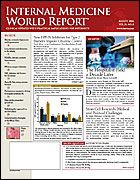Publication
Article
Testosterone Patch for Hypoactive Sexual Desire in Older Women
Author(s):
BOSTON—Once accepted as an inevitable consequence of aging, reduced sexual desire in older women is now believed to be at least in part the result of hormonal deficiency. Nevertheless, the treatment of sexual disorders in women is still lagging behind that in men, in part because of the absence of specific targeted therapies. But as more and more women are addressing sexual issues and asking their physicians for answers, research has intensified in the past few years, and new therapies are being investigated.
Data from a recent study on the efficacy of a testosterone patch for the treatment of hypoactive sexual desire disorder (HSDD) in postmenopausal women were presented at the 88th Annual Meeting of the Endocrine Society.
In this study, use of testosterone therapy in >800 postmenopausal women with HSDD increased sexual desire, with only minimal side effects.
In previous trials, a 300-µg/day testosterone transdermal system improved sexual function and was well tolerated in postmenopausal women with HSDD who were using estrogen or estrogen/ progesterone therapy. However, the safety and efficacy of testosterone without concomitant estrogen use in women is still a subject of debate.
In this latest multinational study, 814 postmenopausal women were randomized to receive testosterone, 150 or 300-µg/day, or a placebo patch replaced twice weekly. At 24 weeks, efficacy was assessed by measuring (1) frequency of satisfying sexual activities as noted in the Sexual Activity Log, (2) sexual desire level based on the Profile of Female Sexual Function, and (3) distress related to sexual function based on the Personal Distress Scale. Hormone levels, adverse events, and lab findings were evaluated over 12 months.
“All the previous studies have involved women taking estrogen,” said lead investigator Susan Davis, MB BS, PhD, director, Women’s Health Program, Monash University, Melbourne, Australia. “With the 300-µg patch group, we saw 2 things. They had a slight increase in the number of [sexual] events they had per month-from 5 events to 6 events-and 80% of the events were satisfactory. This is a significant improvement.”
At baseline, all the women reported 5 events monthly, with only 50% of them satisfactory. An event was defined as a sexual encounter but did not necessarily involve vaginal intercourse. Dr Davis noted that women who received the 300-µg/day dose reported improvements in mood and sexual arousal/desire.
IMWR
“The other thing we looked at, which was not a primary end point, was the frequency of the women experiencing orgasm. It increased from baseline by 115% in the 300-µg group and by 38% in the placebo group; this is a good index that these women not only were reporting more satisfaction, but an end point went along with it that they were recording” in their diaries, Dr Davis told .
No clinically significant changes were found in any of the lab parameters that were measured, including lipids and liver function. In addition, overall adverse events and number of withdrawals because of side effects were similar between the placebo and the active treatment groups. However, there was an increased frequency of unwanted hair in the 300-µg/day group, which Dr Davis said was considered moderate to mild in severity and did not lead to any discontinuations or withdrawals. No significant differences in weight gain were noted.
IMWR
Commenting on the study, Margaret Wierman, MD, of the University of Colorado Health Sciences Center, Denver, told , “Sexual dysfunction in women is extremely complicated. It is very different from men. It is not just a ‘hardware and software’ problem. There are many more psychological impacts and relationship issues that have to be sorted out. That is why [the patch] is not going to be a fix.”
But, she added, these findings are promising, and testosterone patches may benefit a significant number of postmenopausal women with HSDD.






